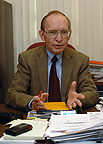January 31, 2008
Jackson: Illinois' primary matters this time
CARBONDALE, Ill. — In contrast to recent presidential primary elections, Illinois voters will play a role in determining the nation's next president when they go to the polls next week.
Political scientist John S. Jackson, a visiting professor with Southern Illinois University Carbondale's Paul Simon Public Policy Institute, said that unlike the primaries in 1996, 2000 and 2004, Illinois voters have more of a say in 2008.
Illinois is one of 22 states holding Feb. 5 primaries on "Super Tuesday," which also includes delegate-rich states California and New York.
Voters were left essentially with no determining role to play in party nominations in the three previous primaries, but moving the primary from March to February is making a difference, Jackson said.
"While we are still going to be a fairly small part of the story next Tuesday night, we are going to be a factor," he said.
Republican Sen. John McCain's primary victory in Florida this week makes his nomination "inevitable." Jackson believes McCain will win Illinois, and voters "will be a factor" in raising McCain's delegate total toward the Republican presidential nomination.
But the votes will also be key among Democrats as Illinois Sen. Barack Obama and New York Sen. Hillary Rodham Clinton compete for as many of the state's Democratic delegates as possible. There are 185 delegates and 26 alternates from Illinois for the 2008 Democratic National Convention, and the candidates' election night vote percentages dictate the allocation of delegates.
Jackson predicts Obama, a former state senator from Chicago, will win the Illinois primary. Clinton will receive at least 15 percent of the threshold vote for acquiring delegates.
"There will be two battles going on across the nation Feb. 5," he said. "One is for the perception of who won each state, but the other is the accumulating delegate count."
Wednesday's announcement that former North Carolina Sen. John Edwards is withdrawing from the Democratic primary changes the dynamic of the race, and likely helps Obama more than Clinton, he said.
But the Democratic nomination remains "up in the air." Tuesday night "will go a long way toward determining that, but it may not entirely settle that issue," he said.
There have been several surprises during the campaign, which began in 2007 for most of the candidates. Jackson said it is healthy when candidates unexpectedly win primaries after public opinion polls predicted a different outcome.
"I think it shows there's a human quality to campaigns that is still unpredictable, and that always makes it not only surprising, but fun for someone like me," he said. Political scientists do a good job at looking for "totally predictable outcomes," but there is a "human, unexplained variance in statistical terms that is always there."
Another of the surprises is the emergence of former Arkansas Gov. Mike Huckabee, whose Iowa caucus win thrust him into the national spotlight. Huckabee — who presented a lecture at SIUC in November 2004 — is a natural choice to serve as McCain's running mate, because he brings the South and evangelical church vote to the Republican Party, Jackson said.
"I think McCain will pick Huckabee. He's become a phenomenon because he's a good campaigner, but he wasn't enough of a phenomenon to win" the nomination.
While political pundits and editorial writers bemoan negative campaigning, Jackson said candidates who do "go negative" in campaigns often win.
"Going negative up to a point is a healthy part of the democratic debate and the political discourse benefits from it," he said. "I'm only skeptical when going negative includes untrue, blatantly false and exaggerated claims against your opponent. That, I think, is beyond the pall and should be condemned rather than rewarded."
Even with Illinois' importance in this year's primary season, the accelerated primary cycle is a mess, and a "terrible way to nominate presidents," said Jackson, who advocates a regional primary system. States were left to set their own primary dates, according to their own interests, rather than with a national view. That resulted in rules challenges and internal debates over delegate eligibility. Voters also believe they have seen too much of presidential politics since 2007, and also sense they don't like the structure, Jackson said.
There are advantages with holding four regional primaries, Jackson said. The easily defined geographic regions of the country would vote on monthly intervals between election days, and the regions rotate the voting order every four years.
Under a regional primary plan proposed by the National Association of Secretaries of State, New Hampshire and Iowa will retain their respective "first in the nation" status for primaries and caucuses, said Jackson, who is working with the group. Candidates will also find the plan economical in how they spend their time and campaign money. There is an effort under way to have the national parties address the proposal during their national conventions this summer.
Caption:
Making a difference — When Illinois voters go to the polls on "Super Tuesday," Feb. 5, they will play a more pivotal role in deciding the nominees than in recent primaries, said political scientist John S. Jackson, a visiting professor with Southern Illinois University Carbondale's Paul Simon Public Policy Institute. He believes Arizona Sen. John McCain will win Tuesday's primary, and that his selection as the Republican nominee is "inevitable." Jackson believes Illinois Sen. Barack Obama will win in Illinois, but the real battle Tuesday with New York Sen. Hillary Rodham Clinton will be securing delegates for the Democratic nomination.
Photo by Steve Buhman, University Communications

